Aside from taking the best supplements for your body, there are also some brilliant foods that contain high amounts of vitamins and minerals our body needs, such as vitamin B foods. We know that it can be tricky to keep track of all the vitamins your body requires, but learning more about the role they play and how you can boost them is well worth your time.
“B vitamins play a vital role in maintaining good health and wellbeing. As the building blocks of a healthy body, B vitamins have a direct impact on your energy levels, brain function, and cell metabolism," explains Clinical Nutritionist, Suzie Sawyer from the Alive! supplement range.
Why do we need B vitamins?
"There are eight types of B vitamin (commonly called vitamin B-complex) that play key roles in many organs and bodily systems," says Suzie. "Although these essential nutrients can work together in the body, they also carry out their own unique functions."
Here's a list of each B vitamin and why we need them:
Thiamin (vitamin B1) - Thiamin aids the nervous system and is essential for the functioning of some important enzymes. These enzymes have vital roles in the processes that make energy available in the body. Thiamin is essential for the transmission of certain types of nerve signals between the brain and the spinal cord.
Riboflavin (vitamin B2) – Riboflavin is essential for the formation of two substances: FAD (flavin adenine dinucleotide) and FMN (flavin mononucleotide). Both are vital for the processes that make energy available in the body. Riboflavin works effectively with iron, vitamin B6 and folic acid. It is important for the nervous system, skin, and eye health.
Niacin (vitamin B3) - Niacin is vital for energy release in tissues and cells. It helps form NAD (nicotinamide adenine dinucleotide) and NADP (nicotinamide adenine dinucleotide phosphate), two coenzymes which are involved in the release of energy from food. Niacin helps maintain healthy nervous and digestive systems. It is also essential for normal growth and for healthy skin and contributes to a reduction in tiredness and fatigue.
Pantothenic acid (vitamin B5) - Pantothenic acid forms part of two substances, co-enzyme A and the acyl carrier protein. These have key roles in the release of energy from foods. Pantothenic acid is involved in the metabolism of protein and fat and is also needed for healthy growth, and is important for mental performance, synthesis and metabolism of steroid hormones, vitamin D and some neurotransmitters while reducing tiredness and fatigue.
Vitamin B6 – Vitamin B6 is important in the functioning of more than 60 enzymes including those responsible for energy production; protein metabolism; RNA and DNA synthesis and the production of red blood cells and antibodies which fight infections. It also supports healthy skin and is essential for maintaining a healthy nervous system.
You can get a combination of these in most vitamin B and vitamin B12 supplements. If you take other vitamins it's not advised to take vitamin C and vitamin B-12 at the same time. That's because high doses of vitamin C can reduce the amount of vitamin B-12 that's absorbed and metabolized by the body, she says. Be sure to take vitamin C at least two hours after vitamin B-12.
Many supplements for skin will also include vitamin B.
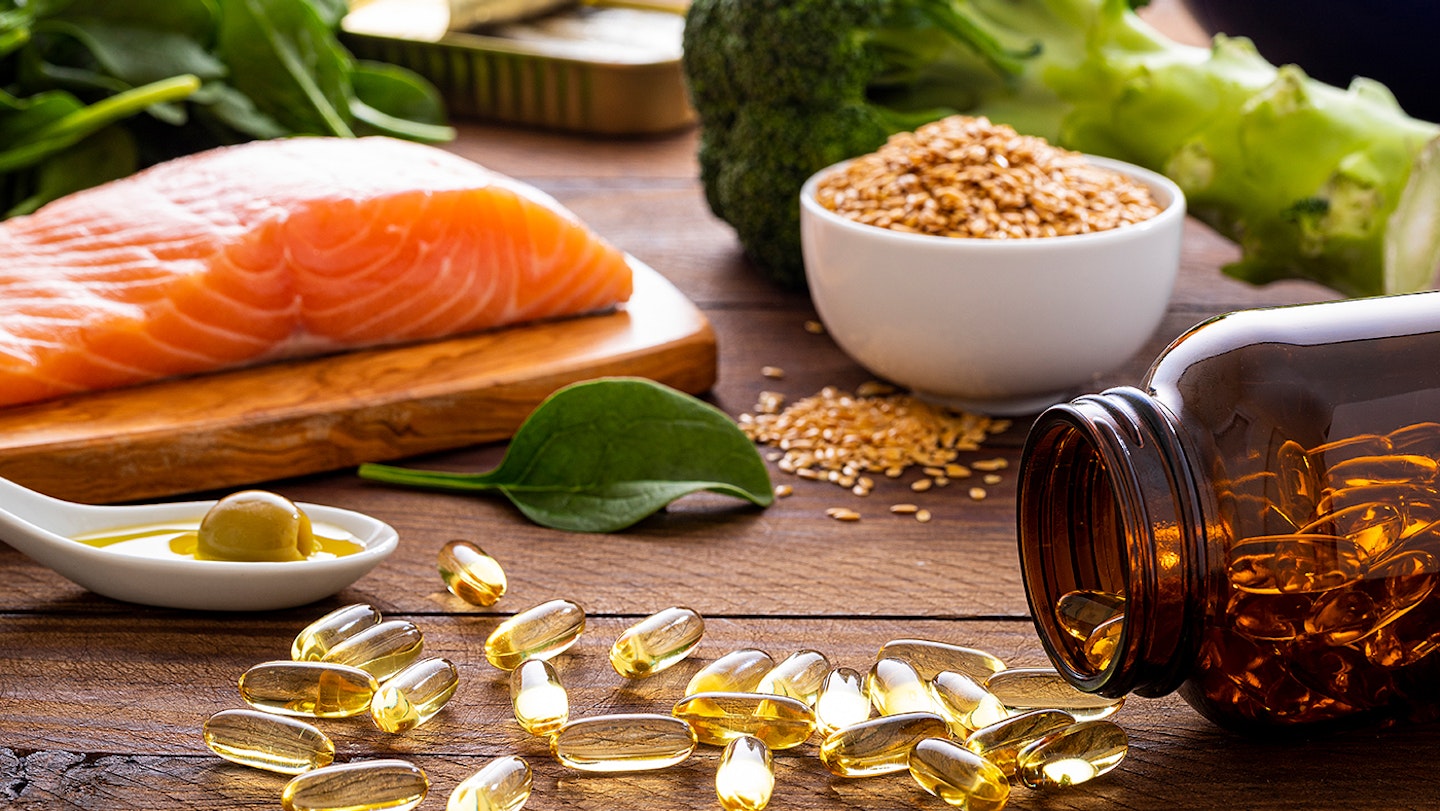
Vitamin B foods
“Obtaining the optimal amount of B vitamins is best achieved through your diet," says Suzie. Below is a summary of the foods that have good levels of each B vitamin.
Brown rice - Thiamin (vitamin B1)
Brown rice, peas, beans and other vegetables, fortified breakfast cereals, wholemeal bread and cereals, eggs, pork, bacon, and liver. While grilled lean pork will give you a solid 1.37 mg of thiamin per 100g, you might think about getting your thiamin from sunflower seeds instead (1.60 mg per 100g) or even via frozen boiled peas, which contain 0.40 mg per 100g.
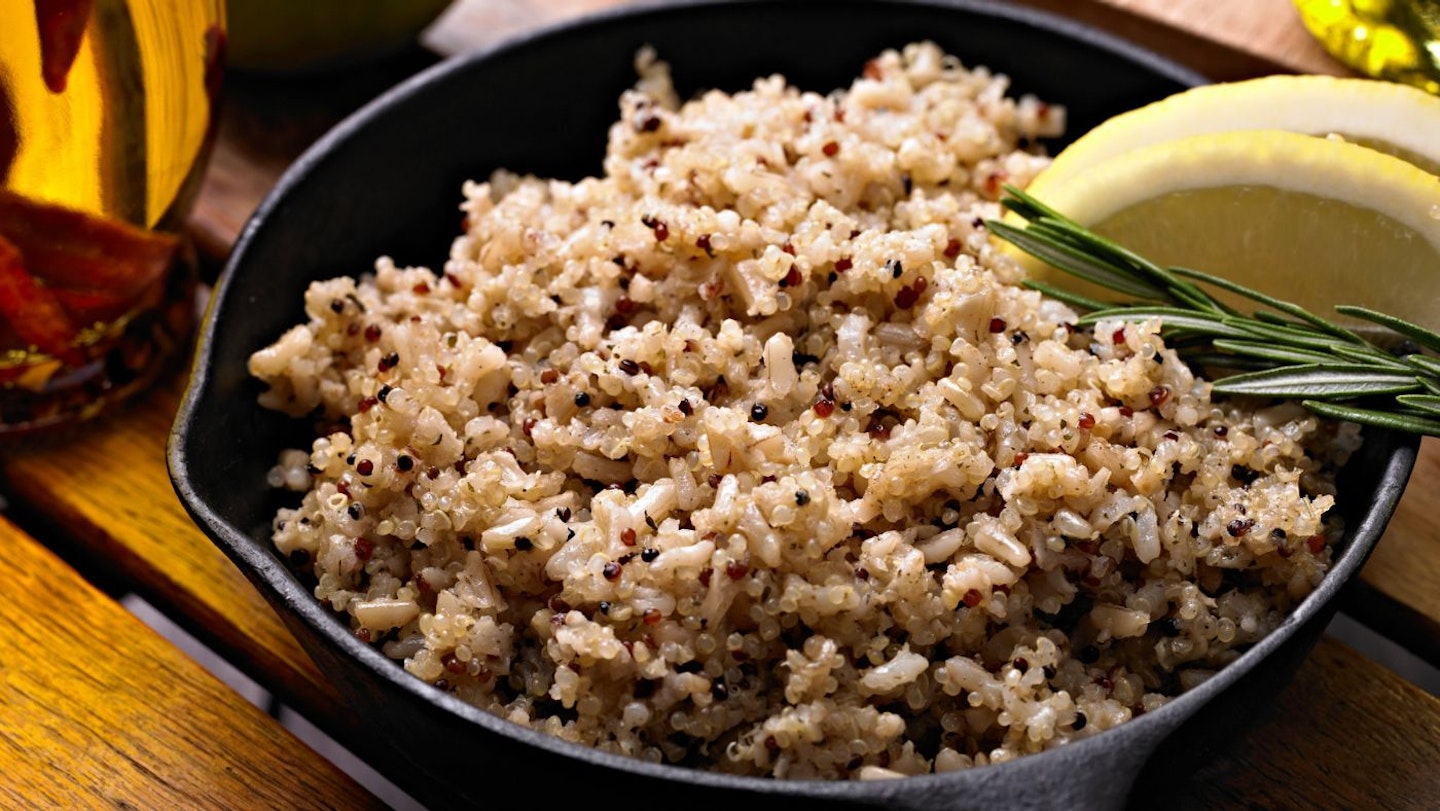
Eggs - Riboflavin (vitamin B2)
Liver, kidneys, fortified breakfast cereals, meat, milk, some green vegetables, eggs, cheese, yeast extracts. These are also foods high in vitamin A too. Riboflavin is degraded by heat and also exposure to light. This is significant with respect to milk, which is a major source of riboflavin (i.e. if milk is exposed to bright sunlight/light for long periods of time). Toasted almonds will give you 1.20 mg per 100 g. Raw baby spinach gives you a good dose of this vitamin too, with 0.18mg per 100 g. Eggs are also good providers of this vitamin along with others, so worth keeping in mind too.
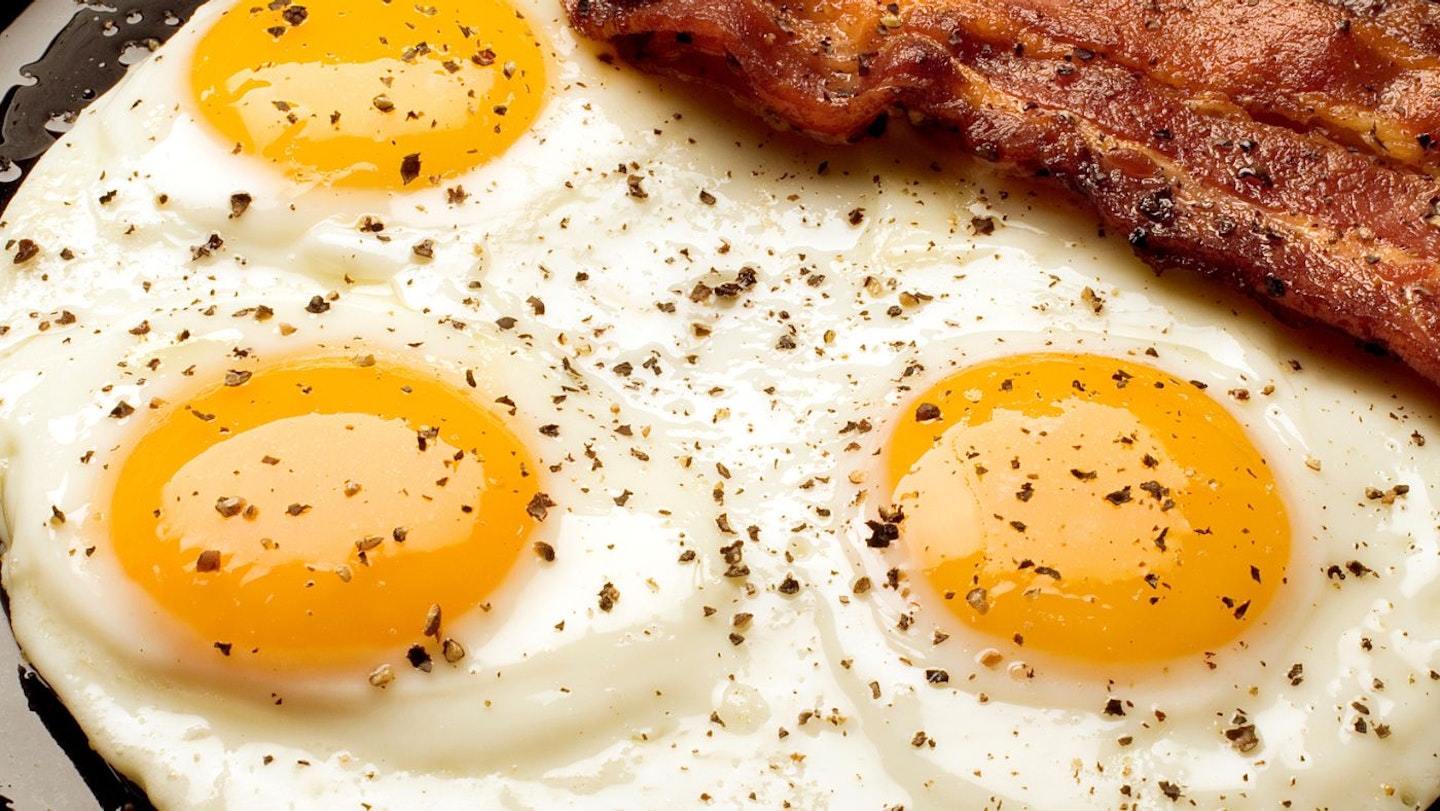
Potatoes - Niacin (vitamin B3)
Meat, oily fish, poultry, bread, potatoes, and breakfast cereals. Fish is an excellent source of the B3 vitamin, and it’ll also give you B6. Just 100 g of canned tuna gives you 10.3 mg, but you can also go for grilled chicken or grilled turkey (15.8 or 14.0 mg per 100 g), mushrooms (6.3 mg per 100 g) or green peas for extra fibre too (2.1 mg per 100 g).
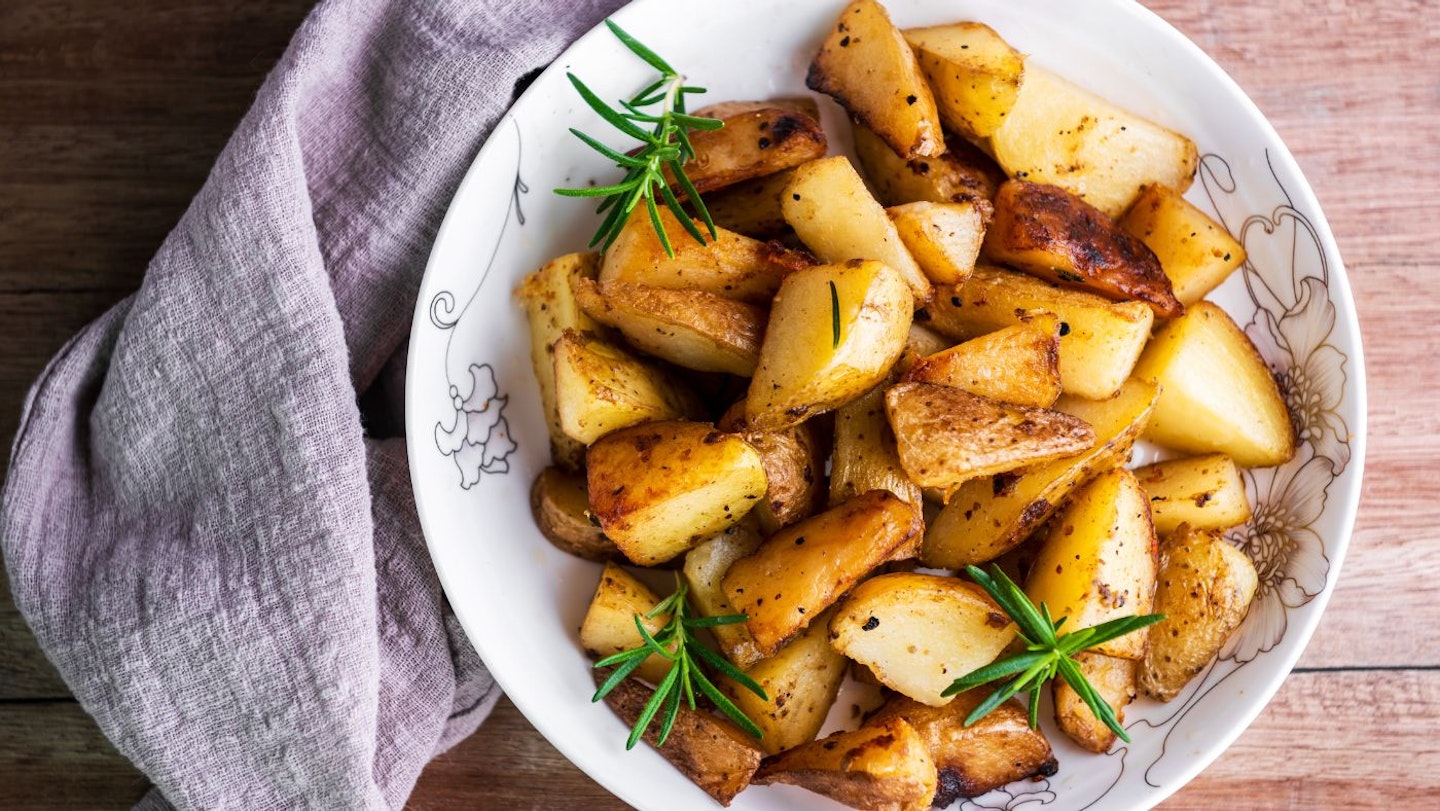
Wholegrains - Pantothenic acid (vitamin B5)
Fortified breakfast cereal, wholegrains (such as brown rice and wholemeal bread), dairy products, liver, kidneys, and eggs. Key sources are beef, chicken, fortified cereals, and some vegetables.
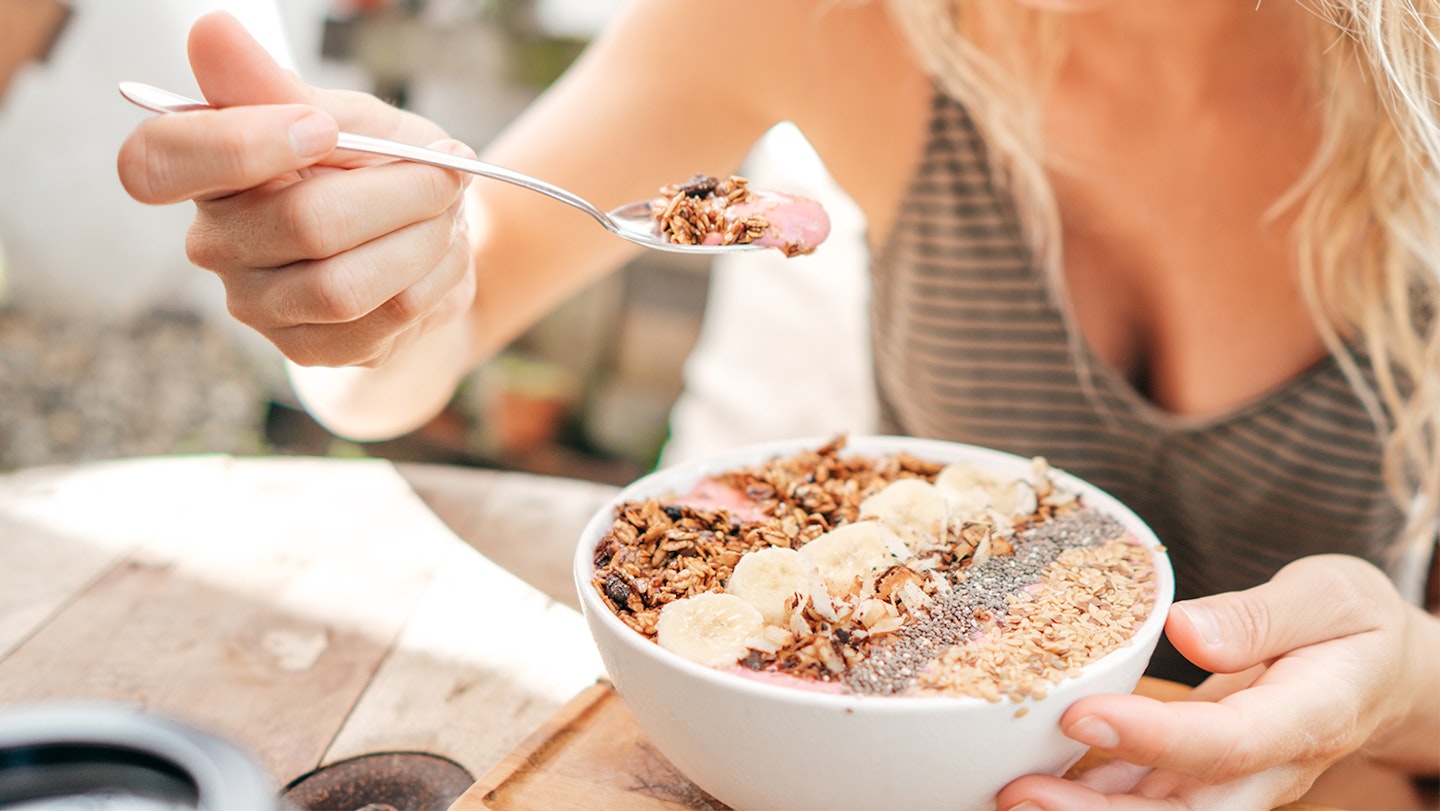
Fish - Vitamin B6
Wholemeal bread, meat (especially liver and pork), fish, bananas, wheat bran and fortified breakfast cereals. Sources include pistachio nuts with 100g giving you 1.12 mg. Tuna contains 1.04 mg per 100 g and turkey has 0.81 mg per 100 g. Spinach is also a good source of B6 as 100g of the green stuff contains 0.24 mg.
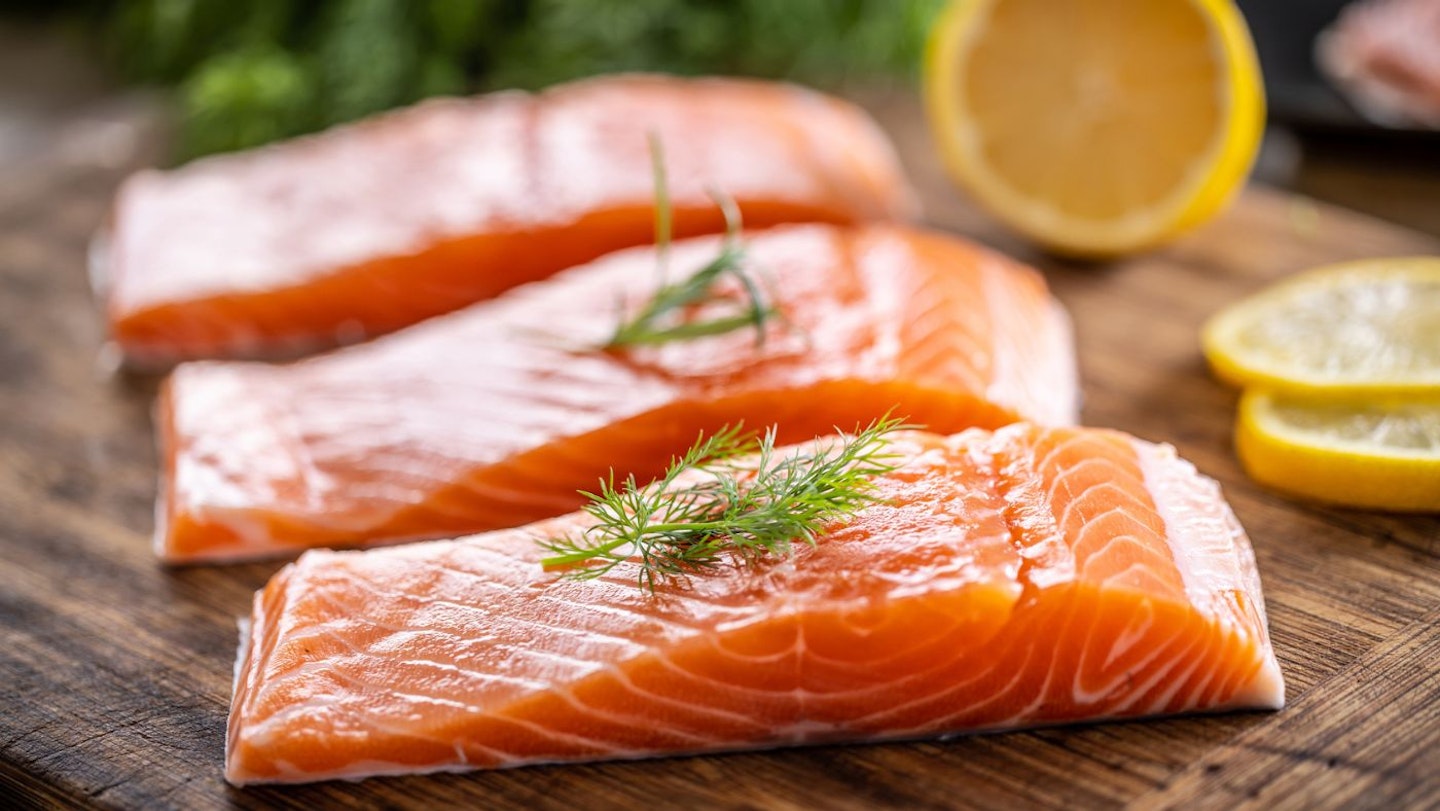
Soya beans - Biotin (vitamin B7)
Biotin is found in many foods and is also synthesised by the microflora in the gut. The richest sources of biotin are liver, kidney, egg yolks, brewer’s yeast, and soya beans. Meat, wholegrain cereals, wholemeal bread, milk, and cheese are also good sources. Green vegetables contain very little biotin.
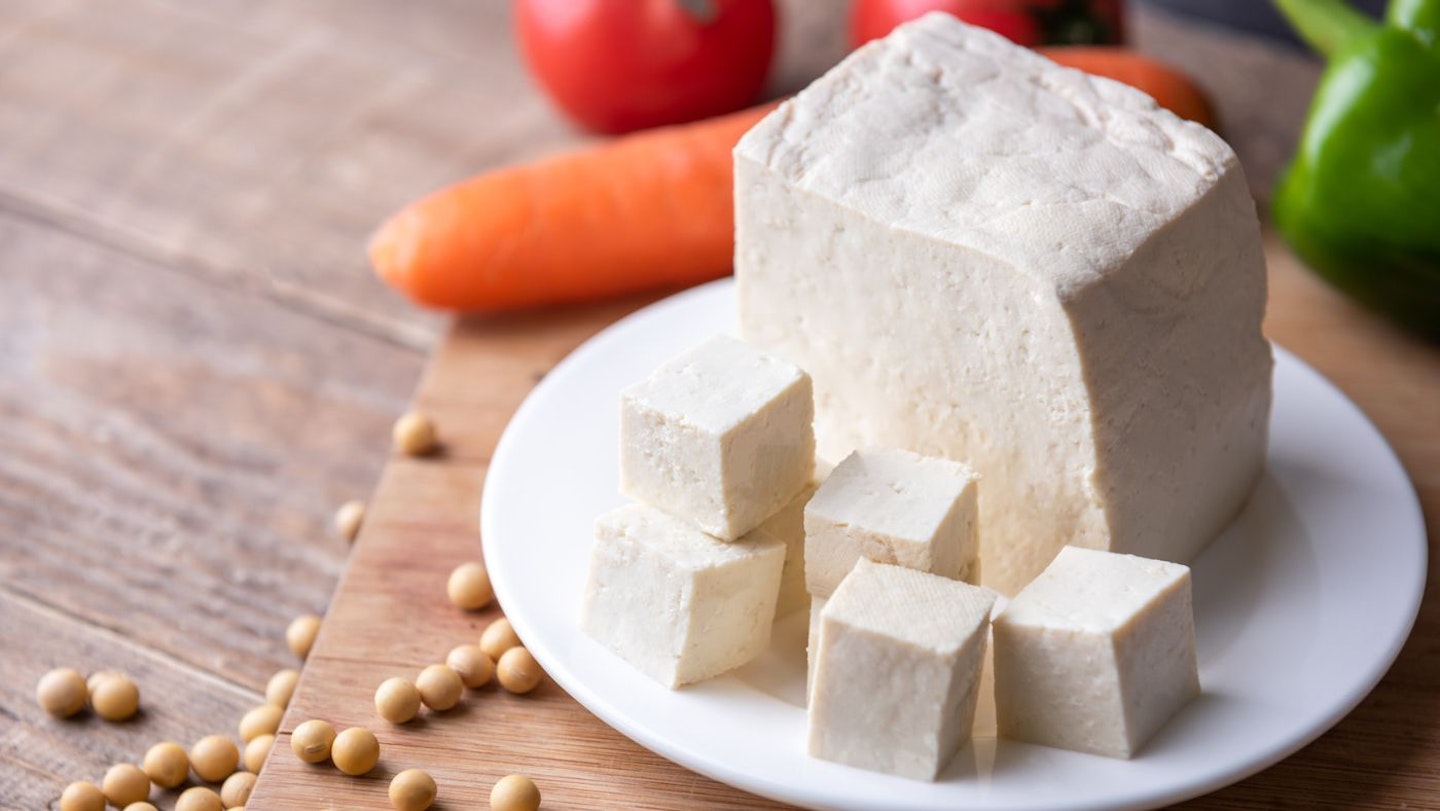
Green vegetables - Folate (vitamin B9)
Folate can be found naturally in yeast extract, wholegrain cereals, liver, brussels sprouts, broccoli, leafy green vegetables, beans, and oranges. Levels of folate are unstable, unless the foods are refrigerated, and can also be destroyed by processing and cooking. Spinach, liver, asparagus, and brussels sprouts are among the foods with the highest folate levels.
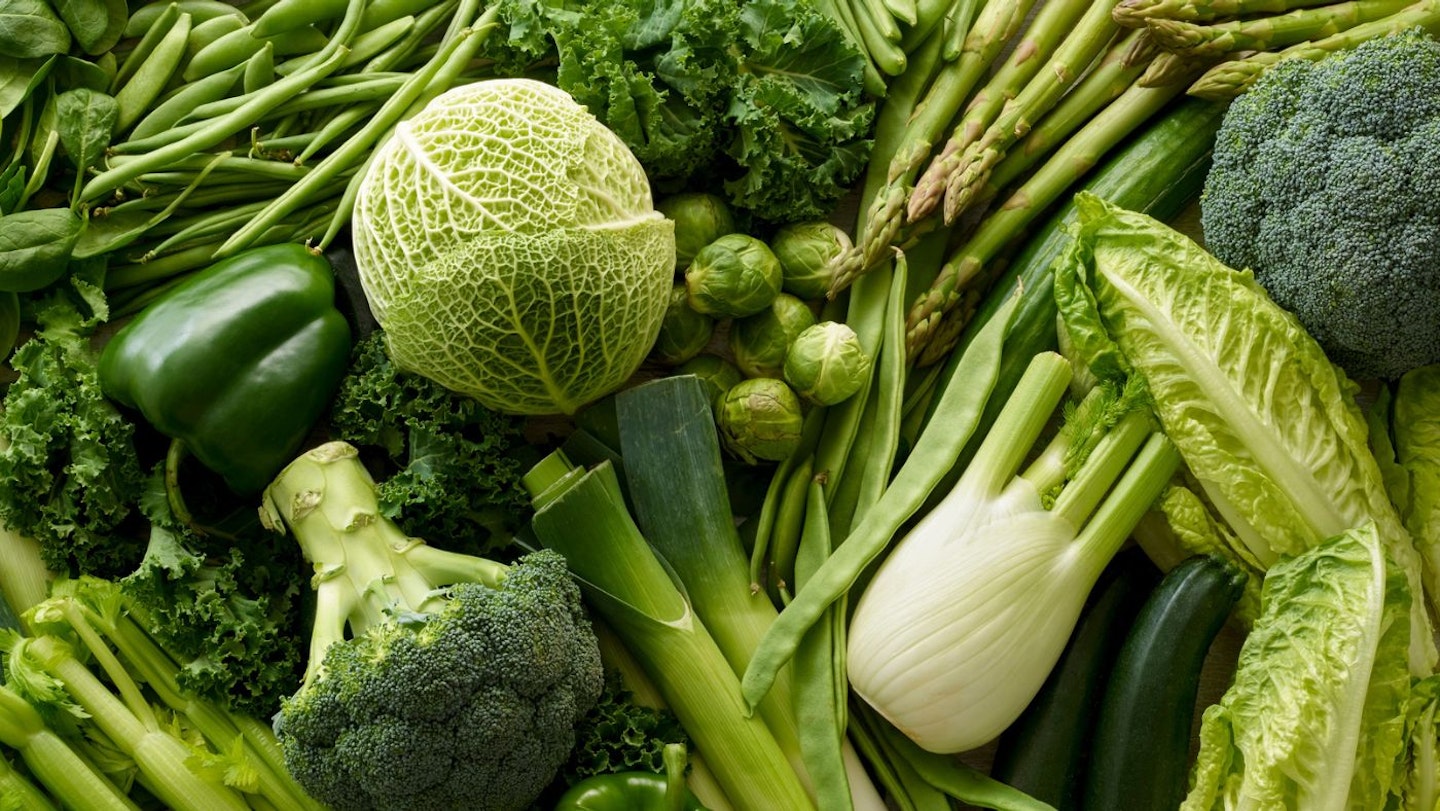
Meat - Vitamin B12
Vitamin B12 can be found only in animal products and certain foods fortified with the vitamin; therefore, vegans and strict vegetarians are at risk of deficiency. Good sources include meat, liver, kidney, poultry, fish, eggs, dairy products and fortified breakfast cereals. A boiled egg will give you 2.0 mcg, a nice start to the day, and if you add just a little shellfish to your lunchtime soup, you’ll get all you need – 100g of clams, for example, contains 9.89 mcg, so you only need a little. Fresh smoked mackerel or smoked salmon is also a good source with 9.1 mcg or 3.2 mcg in 100 g, so again, a cracker with a little mackerel pate is probably enough.
“Having said that, if you struggle with eating at least five portions of fruit and vegetables per day or are following a plant-based diet it is likely that you will have a deficiency in one or more of these essential nutrients. The most commonly deficient B vitamin is B12," Sarah explains. "Deficiency of vitamin B12 leads to enlarged, but fewer red blood cells (megaloblastic anaemia). Other deficiency symptoms include mood changes, sore tongue, fatigue and tiredness, weakness, and lack of concentration."
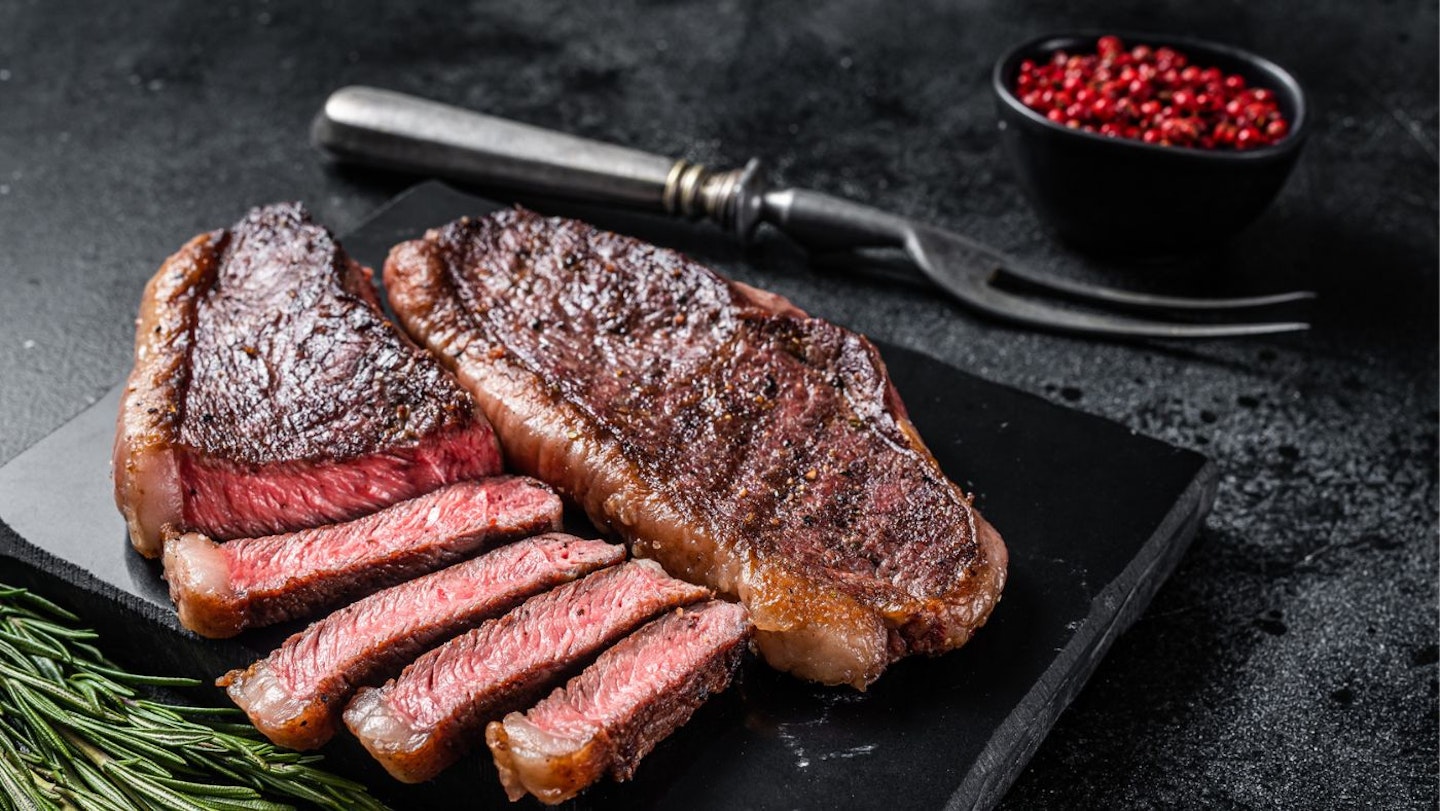
Suzie Sawyer is a Clinical Nutritionist and has spent over 20 years motivating and empowering people to take control of their wellbeing through a comprehensive diet and supplement plan.
Features & Reviews Editor Emily Gilbert has been a journalist since 2016 and has worked across a variety of specialist and lifestyle brands both in print and online. Specialising in product reviews, Emily is the first to know about all the exciting new releases, her favourite being gadgets for the home.
